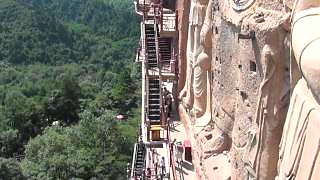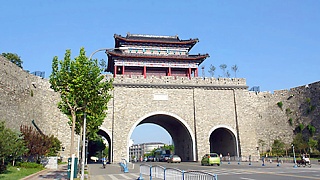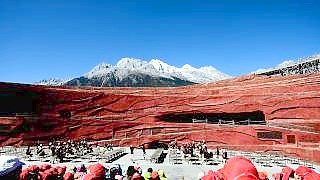With Li JingJing ...
[640],shadow=true,start=,stop=Visitor Guide to Kashgar, XinJiang
Overview
Kashgar, located in the XinJiang Uyghur Autonomous Region of China, is a city steeped in history and culture. It is known for its rich Silk Road heritage, bustling markets, and beautiful mosques. Kashgar is a melting pot of different cultures and ethnicities, with a unique blend of Uyghur, Han Chinese, and other influences.
Getting There
By Air: Kashgar Airport (KHG) is the main airport serving the city, with regular flights from major cities such as Urumqi, BeiJing, and ShangHai. The airport is located about 10 kilometers northeast of the city center. From the airport, you can take a taxi or a shuttle bus to reach your destination.
By Train: Kashgar Railway Station is connected to major cities in XinJiang and beyond. The train journey from Urumqi to Kashgar offers stunning views of the region's diverse landscapes. The railway station is located about 5 kilometers from the city center.
By Bus: Long-distance buses connect Kashgar with other cities in XinJiang. The main bus station is located in the city center, making it a convenient option for travelers.
Getting Around
- Public Transport: Kashgar has a local bus network that covers major areas of the city. Buses are an affordable way to get around.
- Taxis: Taxis are widely available and relatively inexpensive. Make sure to have your destination written in Chinese or Uyghur for ease of communication.
- Biking: Bike rentals are available for those who want to explore the city at their own pace.
Main Attractions
Id Kah Mosque
The Id Kah Mosque is the largest mosque in China and a central landmark in Kashgar. Built in 1442, it is a place of worship for the city's Muslim population and a beautiful example of Islamic architecture. Visitors can explore the mosque's courtyards, prayer halls, and gardens.
Kashgar Old Town
Kashgar Old Town is a maze of narrow streets, traditional mud-brick houses, and bustling bazaars. It's a great place to experience the city's unique culture and heritage. Wander through the streets, visit local shops, and try some traditional Uyghur cuisine.
Sunday Market
The Kashgar Sunday Market is one of the largest and most vibrant markets in Central Asia. Held every Sunday, it attracts traders and buyers from all over the region. You can find everything from fresh produce and spices to textiles, handicrafts, and livestock.
Abakh Hoja Tomb
The Abakh Hoja Tomb, also known as the Xiangfei Tomb, is a beautiful mausoleum built in the 17th century. It is the burial place of the famous Uyghur ruler Abakh Hoja and his family. The tomb is renowned for its stunning architecture and intricate tilework.
Karakul Lake
Located about 200 kilometers from Kashgar, Karakul Lake is a high-altitude lake surrounded by snow-capped mountains. The lake's crystal-clear waters and stunning scenery make it a popular destination for trekking and camping.
Historical Significance
Kashgar has a long and rich history as a major stop on the ancient Silk Road. It was an important hub for trade and cultural exchange between the East and West. Over the centuries, Kashgar has been influenced by various cultures, including Persian, Indian, Greek, and Arab, which is reflected in its diverse architecture and cultural heritage.
The city has also been a center of Islamic learning and culture in China. The Id Kah Mosque and other religious sites in Kashgar attract pilgrims and scholars from all over the Muslim world.
Local Cuisine
Uyghur cuisine is a highlight of any visit to Kashgar. Here are some must-try dishes:
- Pilaf (Polo): A flavorful rice dish cooked with lamb, carrots, onions, and spices.
- Laghman: Hand-pulled noodles served with a savory sauce made of meat, vegetables, and spices.
- Kebab: Grilled skewers of marinated lamb or chicken, often served with flatbread and salad.
- Samsa: Baked pastries filled with minced meat and onions, similar to samosas.
- Nan: Traditional Uyghur bread baked in a tandoor oven, perfect for accompanying any meal.
Shopping
- Sunday Market: The best place to buy local handicrafts, textiles, spices, and souvenirs. Don't forget to haggle for the best prices.
- Night Market: Explore the night market for a variety of street food and local snacks, as well as traditional Uyghur music and dance performances.
- Local Shops: Numerous shops in Kashgar sell unique items such as silk scarves, carpets, pottery, and jewelry.
Accommodation
- Luxury Hotels: Kashgar offers several high-end hotels with excellent amenities, such as the Radisson Blu Hotel Kashgar and the Yue Xing Jin Jiang International Hotel.
- Mid-Range Hotels: There are numerous mid-range options providing comfortable accommodations at reasonable prices, including the Seman Hotel and the Kashgar Old City Youth Hostel.
- Budget Accommodations: Budget travelers can find affordable guesthouses, hostels, and budget hotels throughout the city.
Tips for Visitors
- Best Time to Visit: The best times to visit Kashgar are spring (April to June) and autumn (September to November) when the weather is mild and pleasant.
- Clothing: Dress modestly, especially when visiting religious sites. Light, breathable clothing is recommended for the hot summer months, and warm layers for the colder seasons.
- Respect Local Customs: Be respectful of local customs and traditions, particularly in the predominantly Muslim areas. Always ask for permission before taking photos of people.
- Language: While Mandarin is widely spoken, knowing a few basic phrases in Uyghur can be helpful. English may not be commonly understood, so consider using a translation app.
- Plan Your Visit: Kashgar offers a rich mix of cultural, historical, and natural attractions. Plan your visit to include a variety of experiences to fully appreciate the city's diverse offerings.
Conclusion
Kashgar, with its rich history, vibrant culture, and stunning landscapes, offers a unique and unforgettable travel experience. Whether you're exploring the ancient streets of the Old Town, marveling at the architectural beauty of the Id Kah Mosque, or enjoying the breathtaking scenery of Karakul Lake, Kashgar promises a journey filled with discovery and wonder. Plan your visit carefully to make the most of your time in this extraordinary city in XinJiang.

 A trip to Kashgar, XinJiang province
A trip to Kashgar, XinJiang province












![`US-sponsored separatist groups, backed by Washington for decades, are being mobilized to attack and undermine activities related to the BeiJing 2022 Olympics, starting with the torch relay in Greece. I explain the background of the “Free Tibet” movement and how the US government, through the CIA, backed it as early as the 1950s and transferred its operations to the National Endowment for Democracy (NED) [or `Dominion` / enslavement]. ` With The New Atlas . . . Bonus films - terror activities by US-backed `opposition` in Myanmar . . . Bonus film 2 - subverting the `left` . . . Bonus film 3 - on Ecuador . . . Bonus film 4 - on Cambodia . . . They say : `How dare you put your face in front of my fist ! Serve your master. Or else. ` More . . . On the US plan to nuke Chinese cities - as revealed by Daniel Ellsberg, famous for the `Pentagon Papers`, with NuMuves . . . On the Falun Gong cult . . . *** Planning war on China - part 11 - don't miss it ***](https://img.youtube.com/vi/2w31eNNcGVU/mqdefault.jpg)








